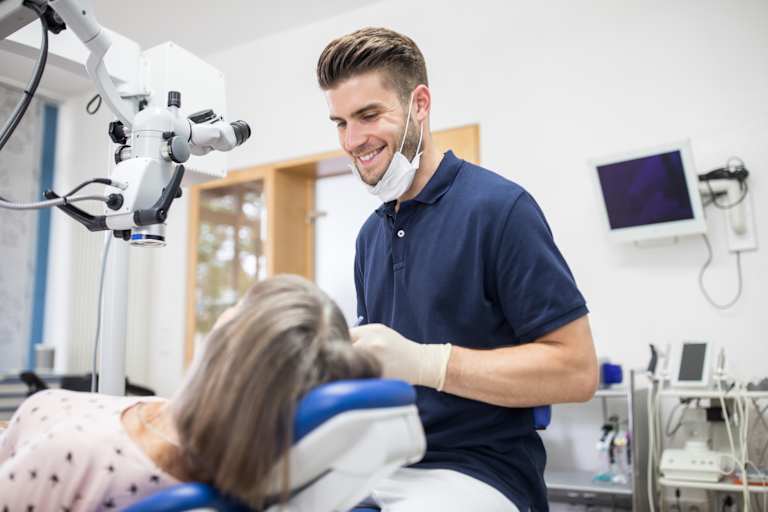Best Online Dental Hygiene Programs of 2024
 2024
2024An online dental hygiene program can open doors to opportunities in the clinical field, education, sales, and public health. If you have college credits, you can use them to earn an online degree, and within two years, you could be starting a new career.
Let’s discover what you can do with an online dental hygiene degree, the requirements for admission, and our ranking for the best programs in 2024.
Popular Online Programs
Learn about start dates, transferring credits, availability of financial aid, and more by contacting the universities below.
The Best Online Dental Hygiene Programs
University of Michigan-Ann Arbor
Ann Arbor, MI
- 4 year
- Campus + Online
- In-State$16,865
- Out-of-state$54,769
- In-State$24,902
- Out-of-state$50,136
- Retention Rate97%
- Acceptance Rate20%
- Students Enrolled50,278
- Institution TypePublic
- Percent Online Enrollment34%
- AccreditationYes
- In-State$34,700
- Out-of-state$34,700
- In-State$22,950
- Out-of-state$22,950
- Retention Rate79%
- Acceptance Rate98%
- Students Enrolled7,304
- Institution TypePrivate
- Percent Online Enrollment21%
- AccreditationYes
Ohio State University-Main Campus
Columbus, OH
- 4 year
- Campus + Online
- In-State$11,018
- Out-of-state$34,101
- In-State$11,560
- Out-of-state$37,512
- Retention Rate94%
- Acceptance Rate57%
- Students Enrolled61,677
- Institution TypePublic
- Percent Online Enrollment77%
- AccreditationYes
University of Missouri-Kansas City
Kansas City, MO
- 4 year
- Campus + Online
- In-State$9,579
- Out-of-state$26,331
- In-State$10,152
- Out-of-state$26,210
- Retention Rate72%
- Acceptance Rate76%
- Students Enrolled16,003
- Institution TypePublic
- Percent Online Enrollment44%
- AccreditationYes
Northern Arizona University
Flagstaff, AZ
- 4 year
- Campus + Online
- In-State$10,381
- Out-of-state$16,600
- In-State$10,724
- Out-of-state$19,266
- Retention Rate74%
- Acceptance Rate78%
- Students Enrolled28,711
- Institution TypePublic
- Percent Online Enrollment55%
- AccreditationYes
 How We Rank Schools
How We Rank Schools
To create this ranking, BestColleges sourced the most recent data available from the National Center for Education Statistics and the U.S. Department of Education College Scorecard. We then ranked each school according to the top variables college students selected in our College Choice and Admissions Survey. To learn more, check out our full rankings methodology or read the summary below.
What Can I Do With an Online Dental Hygiene Degree?
When you earn a bachelor’s degree from an online dental hygiene program, you become qualified to work in a variety of subfields, including administration, research, management, and business. You may also choose to pursue a role as an instructor in dental hygiene programs.
Additional non-clinical career options include dental treatment coordinator, dental supply sales manager, and dental office manager. Specialty certification is available for graduates who wish to pursue careers in oral systemic education, implant maintenance, public health, laser technology, and oncology. With an online dental hygiene degree, you can also specialize in cosmetic dentistry, periodontics, and pediatrics.
How Much Can I Make With an Online Dental Hygiene Degree?
Earning potential varies based on your experience, your certifications or specializations, your employer, and the cost of living in your area.
According to the Bureau of Labor Statistics (BLS), the salary for a dental hygienist ranges from $65,110-$118,400. The median salary for all dental hygienists was $87,530 as of May 2023. Hygienists are paid the most at dental offices, followed by physician offices and outpatient care centers.
Entry-level positions generally only require an associate degree, but earning a bachelor’s degree increases your earning potential and career options. The BLS projects jobs for dental hygienists to increase by 7% from 2022-2032, much faster than the job growth rate across all occupations.
What to Look for in an Online Dental Hygiene Program
There are several important metrics to consider when you are choosing an online dental hygiene program. The data points below factor into our top program ranking. Each of these is an indicator of the quality of the program and should be included in your considerations.
Accreditation
Programmatic accreditation ensures that you will receive an education that meets national standards. Online dental hygiene programs should be accredited by the Commission on Dental Accreditation (CODA). All programs on our ranked list are accredited.
Program Length
Students must complete roughly 120-128 credits to earn a bachelor’s degree, but in a degree completion program, the number could be as low as 32. Your number of transfer credits and program scheduling will impact how long it takes to complete a program.
School Graduation Rate
A program’s graduation rate is an indicator of quality, support services, student satisfaction, and potential career success. The graduation rate is a piece of valuable information you can use to assess your likelihood of success in the program.
Online Learning Format and Requirements
You should carefully consider a program’s online learning format, technology requirements, and IT support services. Make sure they meet your needs and won’t cause more stress during your program.
What Can I Expect From an Online Dental Hygiene Program?
After applying to an online dental hygiene completion program, the school determines how many transfer credits you can carry over and identifies the coursework you need to graduate. A program’s length depends on the number of credits you need to complete to finish the program. Many schools require you to have completed an accredited associate degree program in dental hygiene and hold a current license.
Online coursework commonly covers topics like advanced clinical practice and patient care, teaching, research, dental hygiene administration, and public health programming. Many programs are designed for working adults and may indicate the number of hours per week you must commit to completing the program.
Some schools allow concurrent enrollment in a dental hygiene associate degree program and a bachelor’s degree completion program, which can significantly shorten your time to graduation.
What Are the Admission Requirements for Online Dental Hygiene Programs?
Each online dental hygiene program has traditional admission requirements and may have others that are unique to the school. For example, while many programs ask applicants to complete an in-person or virtual interview, some also require an online computer skill test to ensure students have the computer skills necessary for online learning.
Admission Materials
Nearly all programs require an application and application fee, official transcripts from an accredited program, letters of recommendation, an essay, or a statement of purpose. These materials help the program learn more about you.
Education
Dental hygiene completion programs usually require students to possess an associate degree from an accredited program and a current license. Some allow concurrent enrollment in an associate degree and bachelor’s degree completion program. Applicants may need to have completed certain prerequisite courses, such as college math and statistics. Some programs require chemistry, microbiology, anatomy, and physiology.
GPA
The minimum GPA needed to apply for an online dental hygiene program depends on the program. The minimum can range from 2.5-3.0 in college courses or an unweighted high school GPA of 3.2 or higher for those applying directly to a dental hygiene bachelor’s program.
Licensure
Some programs consider students who have not earned an associate degree and thus are not eligible for licensure. Many programs require applicants to be licensed or eligible for licensure to be admitted.
How Much Does an Online Dental Hygiene Program Cost?
According to the American Dental Education Association, the average estimated total cost of tuition and fees for an associate degree is $22,692. The average cost of a bachelor’s degree was $38,140 and a master’s degree was $36,382.
Prospective students should also consider the cost of books and supplies, personal expenses, medical insurance, and dental hygiene instruments. Students have the option of applying for grants and scholarships to help assist in paying for their program costs. Additionally, online education can be less expensive than an in-person program.
Average Annual Tuition Cost of a Bachelor’s Degree, 2022-2023
Public Institution
$9,750
Private Institution
$35,248
Everything Else You Need to Know About Online Dental Hygiene Programs
While it is possible to take some of the coursework online, becoming a dental hygienist also requires in-person clinical training. Whether your program is online or traditional, it must meet accreditation standards set by CODA.




